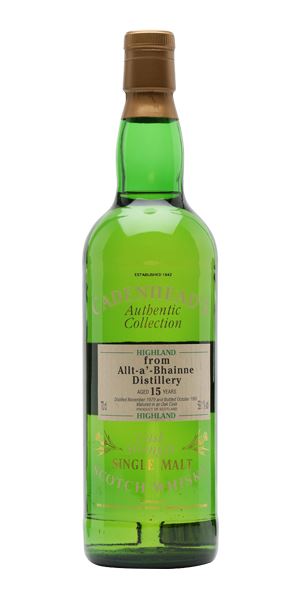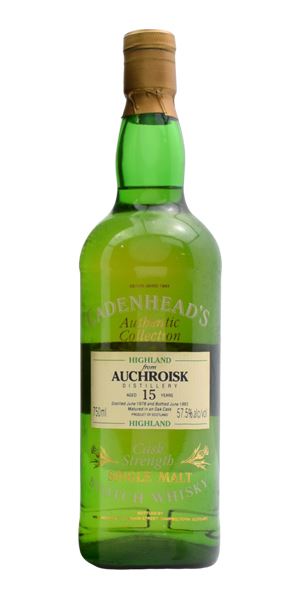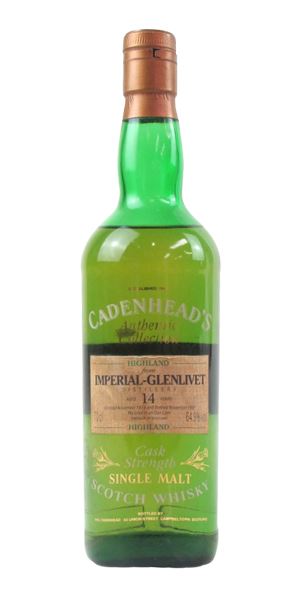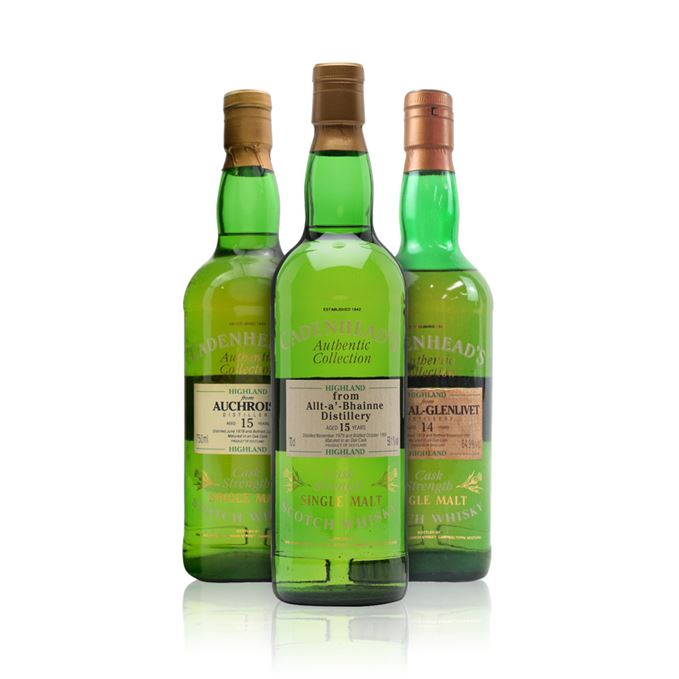-

- Price band
-
£ £ £ £ £
- ABV
- 59.1%
- Production type
- Single malt whisky
- Region
- Speyside
- Flavour camp
- Fragrant & Floral
- Nose
Hello in there...? Like so many of these Authentic Collection whiskies it’s austere to the point of silence. Give it time to waken up and there’s a scattering of dried grains, some linen, a little condensed milk, sweet cereals. Pretty basic blending fodder really, truth be told. It’s perfectly clean; it’s just inescapably boring. Water doesn’t do much to rescue things. Perhaps a fleeting nibble of wood spice. Some wool, old sandpaper, white pepper? A blank canvas of a whisky.
- Palate
Tough alcohol. Slightly sour jelly babies, more sweetened milky cereals, stale chalk, a hint of cardboard, some plain porridge, a little green wood. Generally hot, plasticy and tough though. With water it’s still pretty flat and uninspiring. Some lemony fizz, a wee touch of quinine perhaps. Some residual dental floss mintiness. Again this ever so slightly sour edge creeps in.
- Finish
Pretty brief. All on plain boiled sweets, rehydration salts and musty porridge.
- Conclusion
It’s often said that every Scottish distillery has produced at least one or two stellar bottlings over the years. It’s also often said that Allt-a-Bhainne is the exception that proves the rule. An assertion that’s not at all challenged by this whisky. The very height of boredom.
- Right place, right time

- Price band
-
£ £ £ £ £
- ABV
- 57.5%
- Production type
- Single malt whisky
- Region
- Highland
- Flavour camp
- Fragrant & Floral
- Nose
A rather lean and crisp maltiness at first. Lots of freshly kilned malt, dry cereals, some damp pinecones, delicate leafy notes, mustard powder and cornflour. Again it possesses this ‘plainness’ that is so common in these high-octane Authentic Collection bottlings from this era, however, unlike the Allt-a-Bhainne, it has a decidedly more obvious and immediate character. With water it’s brighter, more lemony, yeasty and with a few white stone fruits and floral aspects. Water is pretty essential I’d say.
- Palate
Cooking oils, dough, buttery brown toast, putty, clay, pumpkin seeds and a tiny thread of orange oil. There’s this somewhat typically brutal, concrete, chalk and gravel-style mineral profile that attends so many bottlings in this series but it’s overall clean, taught and punchy. We’re really in barley eau de vie territory here, right up against the raw ingredients with the wood barely whispering its influence. Water unmuzzles the personality rather effectively. There’s petrol, white flowers, ink, soy sauce, lime oils and savoury pastries now, which make for a pleasing dram.
- Finish
Medium in length. All on toasty cereals, white pepper, sourdough, a sprinkle of dried herbs and a generic bready aspect.
- Conclusion
Much better than the Allt-a-Bhainne, however it’s still a tough whisky. As fun as these old high-powered Cadenhead bottlings can be, they can also be tiring. High strength, pure distillate with totally neutral wood leaves nowhere to hide. In many ways these bottlings are totally fascinating for the sheer levels of illumination they offer on different distillery profiles from this historically important era of flux and change.
- Right place, right time
Handy, all-purpose fuel/obliteration juice to use for bartering in a post-apocalyptic/Brexit hellscape.

- Price band
-
£ £ £ £ £
- ABV
- 64.9%
- Production type
- Single malt whisky
- Region
- Speyside
- Flavour camp
- Fruity & Spicy
- Nose
Rich and petroly. A kind of quivering waxiness, stone fruits, olive oil, fruity muesli and lively notes of lemon barley water and herbal toothpaste. An abundance of character compared to the other two. There is a nice natural fattiness to the distillate which comes across well with these oily and slightly slithering waxy qualities. Water moves things towards buttery cereals, carbon paper, root vegetables, rich earthiness and notes of furniture polish and new leather.
- Palate
Even at full strength this is tolerable. The richness of the distillate means you don’t feel the heat of the alcohol to the same degree as the others. Here it’s full of naturally sweet malt extracts, stone fruit syrups, aged Riesling, mineral oil, petrol, brake fluid and ink. There’s a touch of medicinal cough syrup as well. Water really enhances this medical aspect. There’s lots of ointment, embrocations, soot, aspirin, hints of eucalyptus mouthwash and Tiger Balm.
- Finish
A long, hearty medical-accented rush of warmth, minerals, soft waxes and fading herbal resins.
- Conclusion
When you have well-made, characterful distillate such as Imperial, that’s when these bottlings really come into their own. This is terrific, beautifully textural, flavoursome distillate that is perfect at this age. If these bottlings demonstrate anything, it’s that if you make something bland it will remain bland. Make something with a wealth of personality and that personality will shine well without any overtly active wood to help it on its way. A delicious wee lesson from the heart of Scotch whisky’s era of modernisation.
- Right place, right time
A spot of furtive winter home brewing.

During the 1990s Wm Cadenhead bottled a multitude of single malt bottlings under its Authentic Collection label which Angus MacRaild claims could be described charitably as ‘intellectual’ or ‘challenging’. Perhaps less charitably, he says, they could also be labelled: ‘tough’, ‘difficult’, ‘extreme’, or, as they are often termed ‘crazy’. Thankfully, as MacRaild notes, they are also often fun as well.
Almost always pale whiskies from older refill casks, bottled at younger ages and often very high strengths, these are the kinds of malts that would later find their way into higher profile series such as the Rare Malts at more mature ages. They hail from an era when water and cask shortages often led to fillings being done at unreduced strengths, a practice that led to exceptional whiskies when at greater ages, but rather extreme and austere characteristics in youth.
First up is an example from one of Scotland’s lesser-known and ‘least loved’ distilleries: Allt-a-Bhainne. Distilled in 1979 and bottled in 1995, MacRaild finds it clean but crushingly dull and devoid of life or character. No danger of Allt-a-Bhainne ascending in the collective estimation any time soon based on this particular example.
Thankfully a 1978 Auchroisk bottled in 1993 is a considerable improvement that displays some good malty, cereal character and works well with water, although MacRaild still finds it a tad lacking in overall personality.
Which is not something you could say for the final dram, a 1979 Imperial bottled in 1993 at a whopping 64.9%. MacRaild finds it a terrific, bold and characterful example of this sadly departed make, and a shining example of how the old Cadenhead Authentic Collection series really exposed the raw character of Scotland’s distilleries during the late 1970s/early 1980s era of production.

